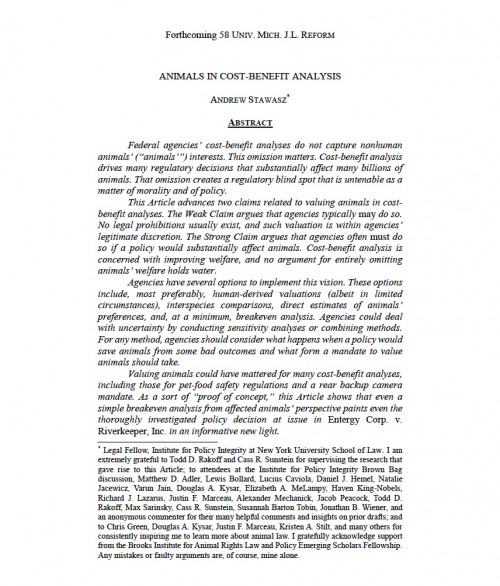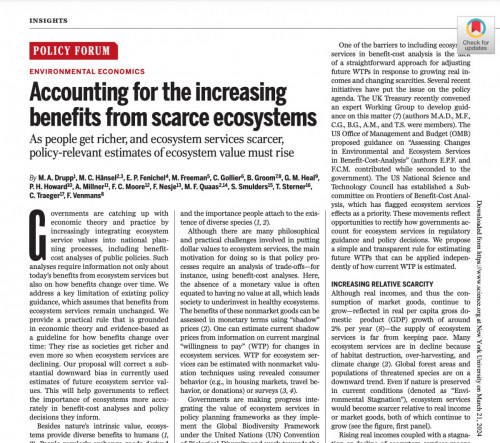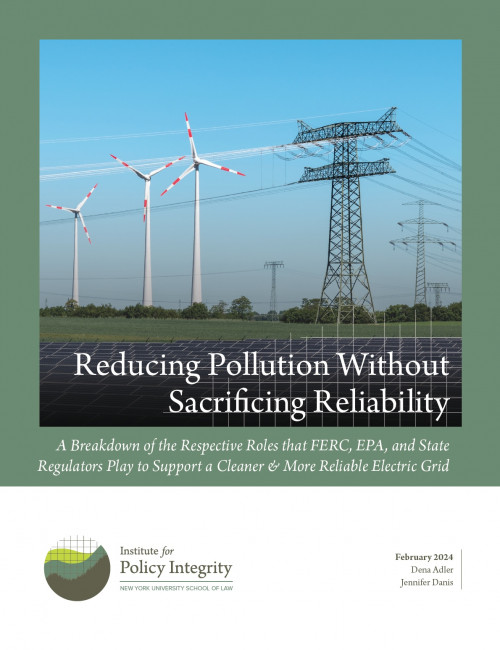-

Animals in Cost-Benefit Analysis
Forthcoming in the University of Michigan Journal of Law Reform
Federal agencies’ cost-benefit analyses do not capture nonhuman animals’ interests. This omission matters. Cost-benefit analysis drives many regulatory decisions that substantially affect many billions of animals. That omission creates a regulatory blind spot that is untenable as a matter of morality and of policy. Valuing animals could have mattered for many cost-benefit analyses, including those for pet-food safety regulations and a rear backup camera mandate. As a sort of “proof of concept,” this Article shows that even a simple breakeven analysis from affected animals’ perspective paints even the thoroughly investigated policy decision at issue in Entergy Corp. v. Riverkeeper, Inc. in an informative new light.
-

Accounting for the Increasing Benefits From Scarce Ecosystems
As people get richer, and ecosystem services scarcer, policy-relevant estimates of ecosystem value must rise
Governments are catching up with economic theory and practice by increasingly integrating ecosystem service values into national planning processes, including benefit-cost analyses of public policies. Such analyses require information not only about today’s benefits from ecosystem services but also on how benefits change over time. We address a key limitation of existing policy guidance, which assumes that benefits from ecosystem services remain unchanged. We provide a practical rule that is grounded in economic theory and evidence-based as a guideline for how benefits change over time: They rise as societies get richer and even more so when ecosystem services are declining. Our proposal will correct a substantial downward bias in currently used estimates of future ecosystem service values.
-
Comments to NYSERDA on Proposed Cost-Effectiveness Test for Updates to the State Energy Conservation Construction Code
The Institute for Policy Integrity submitted comments to the New York State Energy Research and Development Authority (NYSERDA) regarding its proposal for a new cost-effectiveness test for updates to the state energy conservation construction code. We recommended changes and clarifications that NYSERDA and the Code Council can make to improve their evaluation criteria.
-
Comments to Treasury on 45V Clean Hydrogen Production Tax Credit
Policy Integrity commented on the Department of Treasury's proposed regulation to implement the Section 45V tax credit for clean hydrogen production from the Inflation Reduction Act. This tax credit subsidizes the production of hydrogen based on its emissions intensity. Our comments leveraged our expertise on the electric grid to advise Treasury on how to accurately measure the emissions intensity of hydrogen from grid-connected electrolyzers.
-

Reducing Pollution Without Sacrificing Reliability
A Breakdown of the Respective Roles that FERC, EPA, and State Regulators Play to Support a Cleaner & More Reliable Electric Grid
Multiple federal and state regulators must coordinate their efforts to ensure electric grid reliability, particularly during a period of major transition, and it is important to understand what role each of them plays. This report reviews the respective roles of FERC, RTOs/ISOs, other transmission operators, state public utility commissions, and state environmental regulators. EPA’s duty to reduce GHG emissions that endanger public health and FERC’s duty to steward grid reliability will require them to coordinate each other’s respective expertise as they work with RTOs/ISOs, state regulators, and utilities to implement EPA rules.
-
Comments to EPA on Draft Scientific Integrity Policy
On February 23rd, Policy Integrity submitted comments to EPA on its draft Scientific Integrity Policy. The draft Policy appropriately clarifies that economic analyses are protected by the same integrity policies as other scientific assessments, but it currently cites EPA's 2010 Guidelines for Performing Economic Analyses as the only example of a best-practice document that "should be followed" when assessing benefits, costs, and economic impacts. Several key elements of those 2010 guidelines are out of date, notably the recommendations on discount rates. Our comments offer a simple redline to ensure that other documents that meet the standards for objectivity--like the updated Circular A-4, or the pending ecosystem service guidance--could also fall under the Policy's proposed protections.
-
Comments to NYPSC on CLCPA’s Zero-Emissions Amendments to Public Service Law
Policy Integrity submitted comments to the New York State Public Service Commission (NYPSC) regarding the section of the Climate Leadership and Community Protection Act (CLCPA) that amends the Public Service Law to add a new section (Section 66-p), which requires, among other things, that, by 2040, “the statewide electrical demand system will be zero emissions.” NYPSC had posed several questions about how it should interpret the requirements for 2040 under the new Public Service Law provision.
-
Comments to CFTC on Voluntary Carbon Credit Derivatives Guidance
In December 2023, the Commodity Futures Trading Commission (CFTC) proposed guidance that identifies key features of high-integrity voluntary carbon credits (VCCs) for exchanges that list certain VCC derivatives. The Institute for Policy Integrity submitted comments that highlight additional sources of CFTC legal authority over these derivatives and suggest improvements to the proposed guidance’s discussions of additionality, leakage risk, quantification, risk of reversal, and exchanges’ discretion to set stringent standards. Finally, our comments recommend that the CFTC explore whether it has other authority to address issues with VCC integrity and whether to seek additional authority from Congress.
-
Comments to FTC on Proposed Rule on Unfair or Deceptive Fees
In 2021, Policy Integrity submitted a petition for rulemaking to the Federal Trade Commission (FTC) calling for a ban on the use of drip pricing. After granting the petition, the FTC in 2023 proposed a Trade Regulation Rule on Unfair or Deceptive Fees (Proposed Rule). The Institute for Policy Integrity submitted comments with suggested edits and additions to the regulatory text to ensure that the Proposed Rule fully codifies FTC's stated objectives. Our comments also suggest several actions to strengthen FTC's breakeven and cost-benefit analyses.
-
Comments to DOE and CPO a National Definition for a Zero Emissions Building
The Department of Energy (DOE) and the Office of Domestic Climate Policy (CPO) published a Request for Information on a National Definition for a Zero Emissions Building. The Institute for Policy Integrity at New York University School of Law (Policy Integrity) submitted comments through DOE and CPO's question-and-answer textbox format.









